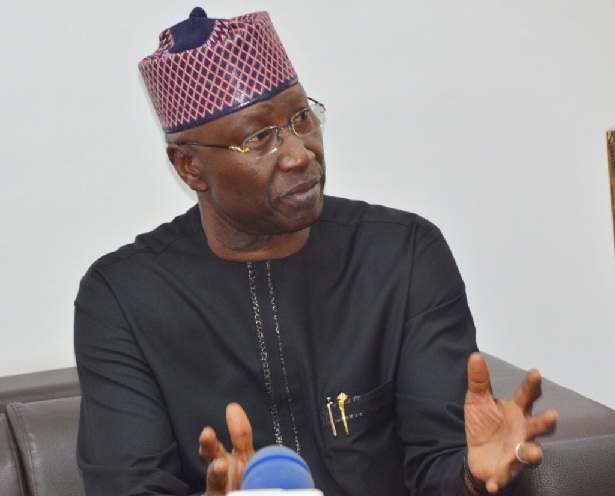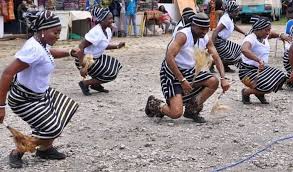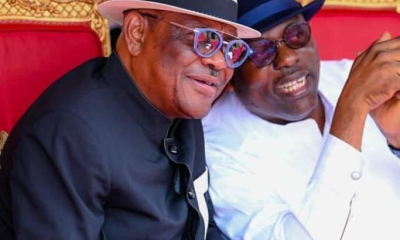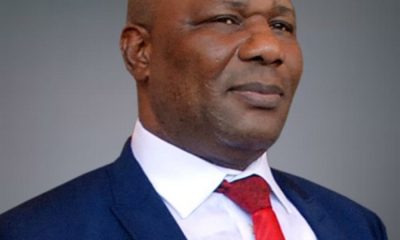Foreign News
COVID-19: Why 18 Chinese Health Experts are Coming to Nigeria – FG

By Laide Akinboade, Abuja
The Federal Government on Monday, explained why the 18 Chinese health experts and doctors are coming to Nigeria saying the visit was on advisory and capacity building basis.
Secretary to the Government of the Federation(SGF)and Chairman Presidential Taskforce on Covid-19, Boss Mustapha, stated this in Abuja, at a news briefing to give update on Covid-19.
He said the PTF by the end of the week will submit its full assessment to advise President Muhammadu Buhari, on the next step to take before the expiration of the 14days lockdown.
According to him, “One major support that has attracted public commentaries is the offer by CCECC, a Chinese company to import about 256 equipment and items in different quantities, notable amongst which are, 1,300,000 medical masks, over 150,000 pieces of assorted personal protective equipment as well as 50 medical ventilators.
The company has also proposed to sponsor public health experts to help strengthen our public health capacity and advise on processes and procedures.“However, I wish to clarify that all Countries of the world seek for and receive help in the fight against COVID-19. The support coming from China is a Corporate Social Responsibility initiative by CCECC, a company with total value of infrastructure contracts worth $10 billion in Nigeria.
“The professionals that have been invited from China are public health specialists and medical engineers that will support Nigeria’s capacity in managing the Pandemic on advisory basis when
necessary, while drawing from the experience of the Chinese.
” In no way shall there be case management and interface with patients. They will train our manpower, advise on procedures and methods, install and test the equipment donated before handling them over”.
The SGF, therefore, appealed to Nigeria’s medical professionals to see the positive aspects of the gesture as an extension of development in the field of medicine.
“The PTF recognizes and respects the competence and capability of Nigerian Doctors and other medical personnel. This is a state of war against the coronavirus and time should not be devoted to unhelpful controversies”, he said.
On restriction of movement in some states in Nigeria including Abuja, he said,”The restrictions on Lagos, Ogun and FCT are now 7days old, and reports from our assessment still show substantial compliance in these places. We shall prepare a full assessment by the end of the week in order to advise Mr. President on the next step to take before the expiration of the 14days lockdown.
“Let me reiterate the fact that these restrictions are not punitive as they are meant to prevent the escalation of the spread especially within communities. As you have noticed, the numbers have risen and this calls for extra caution and extra collaboration by citizens, corporate and religious bodies as well as community leaders. The awareness must reach both the informed and uninformed; and it is our collective responsibility”, he said.
Collaborating the Secretary to the Federal Government points, the Minister of Health, Dr. Osagie Ehanire said the Chinese medical experts, comprising doctors, nurses, laboratory technicians and public health managers will share their knowledge, skills and real-life experience of fighting covid-19 with Nigerian personnel to strengthening management of COVID-19 cases, especially with regard to critical care.
According to him, “18-man team of Chinese medical experts is expected to arrive Nigeria in a few days with a consignment of globally scarce medical supplies, to augment government efforts and build capacity to contain the COVID-19 outbreak.
“The donation by Chinese Companies in Nigeria, includes PPEs, medical consumables, over 1 million surgical masks for health workers and even ICU ventilators, valued at over $100,000, all sourced in the face of global scarcity of these items.
“This initiative will greatly build the capacity of hard-working and resourceful Nigerian Health Care Workers at the forefront of fighting coronavirus. The much needed PPEs and masks will protect our frontline workers and mitigate the spread of COVID-19 in the line of duty.
“We have a window of opportunity to strengthen our own response mechanism through lessons learned from any country that has had the experience and can provide hands-on demonstration of dealing with the outbreak and give the Nigerian clinical workforce the opportunity to share global best practices”, he stressed.
Ehanire added that, over the weekend, we recorded 42 new cases, bringing to a total of 232, the number of confirmed cases of COVID-19 in Nigeria. They are in 14 States and the FCT as at today, 6th April, 2020, We have recorded 5 fatalities in total, all with underlying ailments.
A total of 33 patients have been discharged from treatment. We have 120 patients in Lagos State, 47 in FCT, Osun 20, Oyo 9, Edo 9, Bauchi 6, Akwa Ibom 5, Kaduna 5, Ogun 4, Enugu 2, Ekiti 2, while Ondo, Rivers and Benue have 1 each.
Through enhanced surveillance systems and strengthened epidemic intelligence, we continue to detect cases of COVID-19 and treat them to recovery. We have tested over 5,000 samples so far, and are working hard to scale up capacity in a targeted approach.
He further stated that, Since the last briefing, we have activated two additional laboratories for COVID-19 testing at the Defence Reference Laboratory, FCT and Biosafety Level-3 Laboratory Lagos. In the coming month, we intend to expand further to more laboratory with capacity to test for COVID-19.
“We are working with the African Union to develop a continental response. A Joint Continental Strategy for COVID-19 response has been developed and an African Task Force on Coronavirus (AFCOR) set up to coordinate preparedness and response efforts in the continent.
While ensuring we do not lose gains made in the health sector, we shall continue to support States in strengthening their preparedness and response to COVID-19. Rapid Response Teams are deployed to all the affected states.
Foreign News
Trump, Putin to Meet in Coming Days-Kremlin Says

US President Donald Trump and Russian President Vladimir Putin have agreed to meet in the “Coming days”, the Kremlin has said.
It followed Trump saying there was a “good chance” he could meet his Russian and Ukrainian counterparts together in person “Very soon” to discuss ending the war in Ukraine.
Ukrainian President Volodymyr Zelensky indicated support for that idea, while Putin said he was not against meeting Zelensky but he was “Very far” from it happening.
Trump’s deadline for Russia to agree to a ceasefire in Ukraine or face more sweeping sanctions is due to expire on Friday.
A meeting between Trump and Putin would follow US envoy Steve Witkoff holding talks with the Russian president on Wednesday.
Witkoff has travelled to Moscow four times previously, visits followed by optimism from Trump but ultimately no major breakthrough in peace talks.
Speaking on Thursday, Putin said the United Arab Emirates could host his meeting with Trump, potentially as early as next week.
He said he was “very far” from a meeting with Zelensky because “Conditions” had not been met and there was “still a long haul ahead for creation of such conditions”.
Previously, Putin said he would only meet Zelensky during a final phase of negotiations. Kyiv and its Western partners reject Moscow’s demands for ending the war.
Zelensky indicated his support for a summit, acknowledging that various formats of meetings had been discussed – “Two bilateral and one trilateral” – and added that Europe “must be a participant” in any talks.
He wrote on X: “Ukraine is not afraid of meetings and expects the same brave approach from the Russian side.”
When asked at a White House briefing on Wednesday night whether Zelensky and Putin had agreed to a three-way summit, Trump had said there was a “very good prospect”.
Last month, Trump admitted that after all four of Witkoff’s previous visits, Putin had disappointed him after talks had initially led to optimism.
The US President is now striking a more cautious tone, telling reporters on Wednesday: “I don’t call it a breakthrough…we have been working at this for a long time. There are thousands of young people dying… I’m here to get the thing over with.”
On Wednesday, the Kremlin released a vague statement about Witkoff’s visit, calling the discussions “constructive” and noting that both sides had exchanged “signals”.
Zelensky meanwhile said he had spoken to Trump about Witkoff’s visit, with European leaders also on the call.
The Ukrainian president has been warning that Russia would only make serious moves towards peace if it began to run out of money.
Expectations are muted for a settlement by Friday – when Trump’s deadline expires – and Russia has continued its large-scale air attacks on Ukraine despite the US threat of sanctions.
As pressure builds, Trump on Wednesday signed an executive order imposing a 25% tariff on Indian imports over its continued purchase of Russian oil
Before taking office in January, Trump said he would be able to end the war between Russia and Ukraine in a day. The conflict has raged on and his rhetoric towards Moscow has since hardened.
Three rounds of talks between Ukraine and Russia in Istanbul have failed to bring the war closer to an end, three-and-a-half years after Moscow launched its full-invasion.
Moscow’s military and political preconditions for peace remain unacceptable to Kyiv and to its Western partners.
Russian demands include Ukraine becoming a neutral state, dramatically reducing its military and abandoning its Nato aspirations.
It also wants Ukrainian military withdrawal from its four partly occupied regions in the south-east, and the demobilisation of its soldiers.
Russia also demands international recognition of Ukraine’s Donetsk, Luhansk, Kherson and Zaporizhzhia regions, as well as the annexed Crimea.
Other conditions include a ban on Ukraine’s membership in any military alliances, a limit on the size of the Ukrainian army, Russian as an official language, and the lifting of international sanctions on Russia.
The Kremlin has also repeatedly turned down Kyiv’s requests for a meeting between Zelensky and Putin.
Meanwhile, the US approved $200m (£150m) in additional military aid to Ukraine on Tuesday, including support for drone production.
Foreign News
US Seeks $15,000 for Visa Applicants Deposit from Two African Countries

The US has required citizens from Malawi and Zambia to pay a $15,000 (£11,300) deposit for a tourist or business visa, according to the US state department.
The 12-month pilot programme aims to curb visa overstays or where screening and vetting information is considered deficient according to a notice published by the state department.
It was said that citizens of other countries than Malawi and Zambia may soon also need to pay a similar deposit, which will be returned at the end of their visit to the US.
The US administration has taken several steps to further President Trump’s agenda of stemming illegal immigration.
Trump signed an executive order on the first day of his second term to this effect, and the state department noticed published on Tuesday, says: “Aliens applying for visas as temporary visitors for business or pleasure (B-1/B-2) and who are nationals of countries identified by the Department as having high visa overstay rates, where screening and vetting information is deemed deficient, or offering Citizenship by Investment, if the alien obtained citizenship with no residency requirement, may be subject to the pilot program.
“Consular officers may require covered non-immigrant visa applicants to post a bond of up to $15,000 as a condition of visa issuance, as determined by the consular officers.” Figures published in 2023 by the US department of Homeland Security show that about 14% of visitors from Malawi overstay their visas, compared to 11% of Zambian visitors.
Other countries with high overstay rates include Haiti (31%), Myanmar (27%) and Yemen (20%).
Zambia Foreign Minister Mulambo Haimbe had said the government was “engaging our counterparts to get a full understanding of the implications and what can be done, if anything, to address the underlying issues”.
Since coming to office in January, Trump has signed orders to roll back humanitarian programmes for migrants from certain countries who are already in the US. He has also banned foreign nationals from 12 countries from travelling to the US, and imposed partial restrictions on another seven.
His administration has revoked visas for hundreds of international students and detained several others on college campuses across the US, often without any warning or recourse for appeals.
The state department has said it is targeting those who were involved in activities that “run counter” to US national interests.
Many of those targeted have participated in some form of pro-Palestinian activity.
But there have been other cases where cancellations appear to be connected to those with some sort of criminal record, or legal infractions like driving over the speed limit, immigration lawyers have said.
Foreign News
Ghana Raises Cocoa Prices to $5,040 Per tonne

Ghana on Monday increased the producer price of cocoa by more than 60 percent ahead of the 2025-26 season, a move expected to put pressure on top cocoa-producing rivals like the Ivory Coast.
The move could also raise global cocoa costs even further, at a time when supply chains are already tightening due to climate shocks and ageing farms.
Finance Minister Cassiel Ato Forson said the rate paid to farmers will rise from $3,100 to $5,040 per tonne, a 62.
58-percent increase.“The cocoa farmer remains a critical pillar of our economy, and this government is committed to ensuring they benefit from the gains we are making,” the minister said at a news conference in the capital, Accra.
Ghana, the world’s second-largest cocoa producer, typically sets its prices ahead of the Ivory Coast, which leads global production.
The Ivorian government is currently paying farmers 2,200 CFA francs per kilogramme, about $3,900 per tonne.
The substantial increase in Ghana is in line with a campaign promise by President John Mahama, elected in December, to raise cocoa farmers’ share of export earnings to at least 70 percent of the Free-On-Board (FOB) value — the price of cocoa at the point it is loaded onto a ship for export.
The FOB price has shot up in recent years, with the current $7,200 price reflecting a blend of earlier contracts signed at $2,600 per tonne during the 2023-24 season and forward sales forecasts for 2025-26, Forson said.
Farmers were previously only receiving 63.9 percent of the FOB price, or $3,100 of the $4,850 FOB value, in the 2024-25 season.
Forson said the revised price also accounts for improved macroeconomic conditions, including a strengthening cedi and easing inflation.
Ghana’s price controls are meant to stabilise earnings for farmers, especially during price dips, but critics say they have lagged behind market highs, especially in recent years, as global prices have spiked.
In response, some farmers have joined the country’s gold rush, selling off land to informal miners — many of whom have left environmental destruction in their wake, further squeezing production.
Getting fair prices for farmers — at the bottom of cocoa’s global value chain — has long been a goal of both activists and West African governments, with fingers pointed at both private firms and buyers as well as official corruption.
Forson also announced the reintroduction of the government’s free cocoa fertiliser programme, which includes the distribution of fertilisers, insecticides, fungicides, spraying machines, and flower inducers to increase yields and income.



























